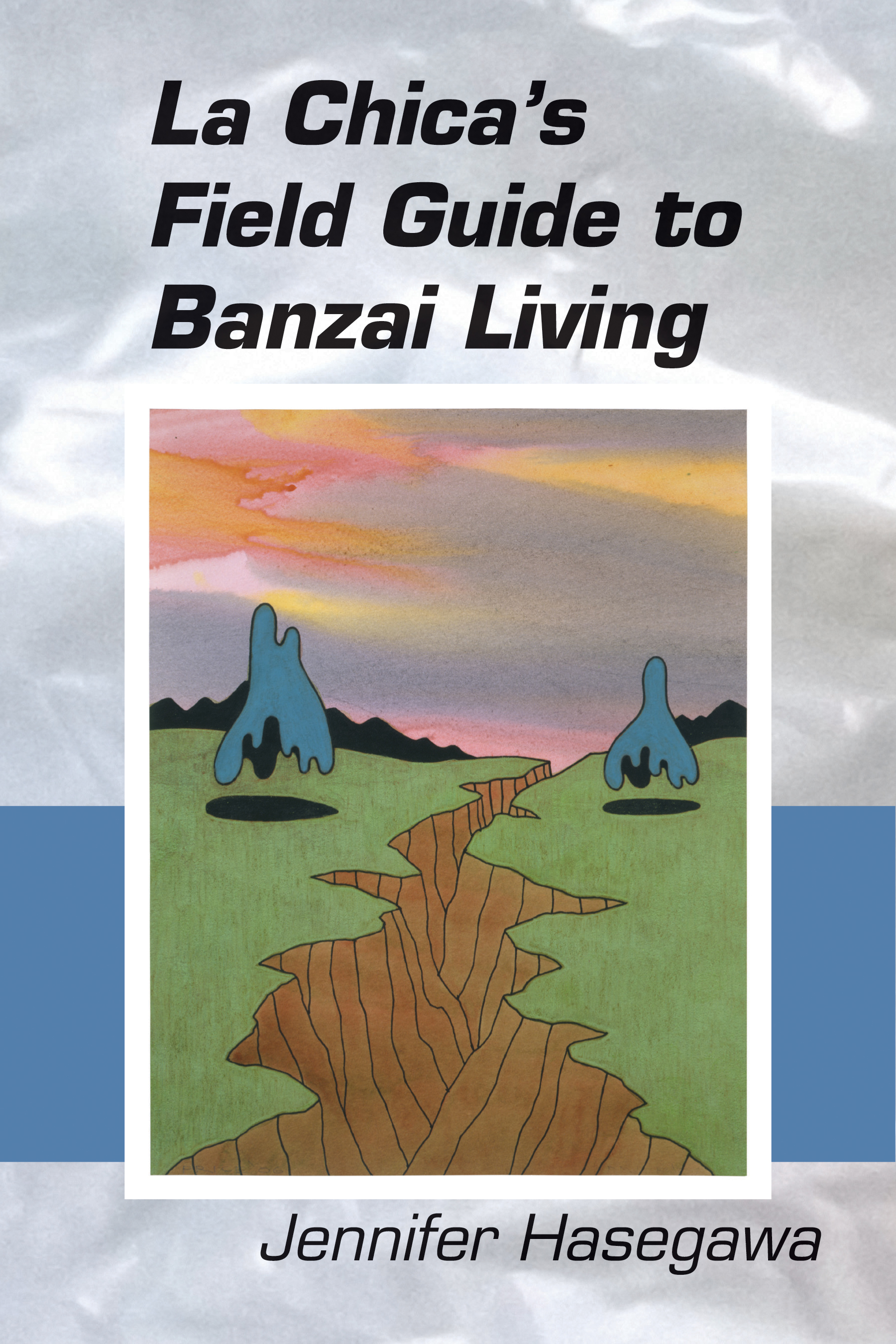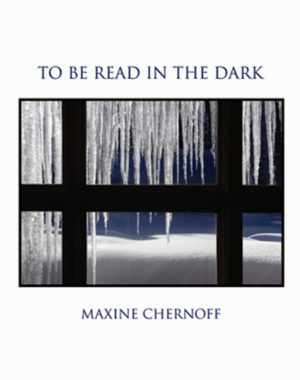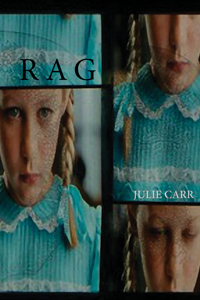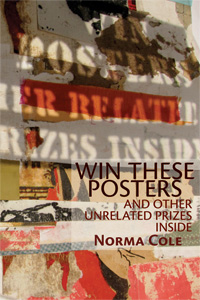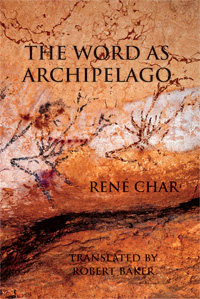Description
From the small towns strung along the coast of the Big Island of Hawai‘i to the land-locked landscapes of Paraguay to the volcanic surface of Venus, this is a field guide to flora, fauna, and mineralia encountered, real and imagined. Packed tightly into exploratory rocket segments, these poems ignite our gravest flaws to send our grandest potentials into orbit, sprinkling us all with an antidotal salve to viewing any life as ordinary.
Banzai has a literal translation of “10,000 years” and was used by the Japanese as a rallying cry in imperialistic and militaristic contexts. Today, the word has a comparatively neutral translation of “Hurrah!” in Japan and beyond. In La Chica’s Field Guide to Banzai Living, Hasegawa aims to reclaim banzai, recasting the language of war and dogmatic loyalty into the language of a life and poetry created against racism and harmful norms, and toward tolerance and self-acceptance.
Hasegawa’s surreal, spectacular intelligence crackles through La Chica’s Field Guide to Banzai Living like high-voltage current through a trunk line. Like its throw-down title, this book mixes the flirty with the elucidating and the go-for-broke. . . . Many poems reveal Hasegawa’s tender attachment to family in her native Hawai‘i, to the sagas of daily life and natural beauty there, which bow but don’t break under the ongoing pressures of colonization. This may be the key to Hasegawa’s poetics: the resilience, the fierce intelligence, the banzai resolve to ‘live for ten thousand years’, not as a war cry but as a love letter, To Anyone Who Can’t Get Home.
Mary Burger, author of Then Go On
Welcome to the Kingdom, its taxonomies and subjugations, its streets and kick ass bards. There are many ways to read La Chica’s Field Guide: a testament to the exponential speed of inequities; a chronicling of a third-generation Japanese American woman’s kamikaze-like memory, witness and resistance; an invocation of the epic power of the familial and the communal as evidenced by the simplest joys and our deepest sorrows. Amidst all of it, is the brilliant, resolute, invincible language of Hasegawa. ‘Astounding alien / clean progenitor of the / new tongue of the ages. She / is here.
Aja Couchois Duncan, author of Restless Continent
Buckle up for Jennifer Hasegawa’s exhilarating ride, whatever sort of displaced being you might be—from immigrant to extraterrestrial—and consult this manual. Follow the poems as they careen through assorted omens and ‘ghosts of sovereignty.’ Touching down in Hawai‘i, California, and other parts of the world, Hasegawa carries her baggage with aplomb. She’s all-too-aware of how old family folkways can linger with the ‘slow-burrowing hoodoo/of suggestion.’ And she’s brazen enough to push through to the next realm of possibilities . . . Let her show you the turns—both thorny and tender— and you just might awaken there.
Molly Bendall, author of Watchful
In the West, the word “banzai” was mostly recognized as the WWII battle cry of kamikaze pilots, but in truth, the word literally means 10,000 years and is associated with wishes for long life and celebration. It is a word that is both complex and compelling. The same could be said for the poems in Hasegawa’s La Chica’s Field Guide to Banzai Living. The collection takes us from Hawai‘i to the U.S. Continent to Babylon to outer space, and Hasegawa’s use of story is both empowering and arresting. . . . What I admire most about Hasegawa’s poems is how she uses darkness to reveal what the world today desperately needs—the presence of light.
Lisa Linn Kanae, author of Sista Tongue
Hasegawa’s poems traverse physical and emotional landscapes that linger in poetic memory.
Maw Shein Win, author of Storage Unit for the Spirit House
In the fashion of Japanese kintsugi, the gaps can be filled and remade… Jennifer Hasegawa’s poems in La Chica’s Field Guide to Banzai Living perform this alchemy, revealing our flaws and our darkness in order to direct our light… Just as we see the need for light by the presence of so much that is dark in Hasegawa’s work, we see ourselves, our present and future desired selves, against who we wish to distance ourselves from. Hasegawa takes our hopeful fantasies of colonizing other planets and, as only one who has experienced true and irrevocable displacement can, shows them for the horrors they will be. In our fears and dislocation we find ourselves—though that doesn’t mean an easy return.
Abigail Chabitnoy, Colorado Review
Constructed as part meditative lyric, part performance and part chant is San Francisco (by way of Hilo, Hawai’i) poet Jennifer Hasegawa’s full-length debut, La Chica’s Field Guide to Banzai Living… Hasegawa’s lyrics write slant on home and displacement, from the traveller to the immigrant to the notion of the alien (both immigrant and extraterrestrial)… Hers is a fierce and intricate, intimate lyric, simultaneously expansive and exploring erasure, erosion… This is an impressive debut, and Hasegawa’s poems are remarkably vibrant, as the performance elements resound from the page with a force enough to echo, refusing to lay flat but to spark and sparkle with energy; I can only imagine how well these pieces work as part of a live performance.
Reviews
About the Author
Interview
Jennifer Hasegawa is a poet and photographer. She’s sold funeral insurance door-to-door and had her suitcase stolen from a plastic surgery clinic in Paraguay. The manuscript for her first collection of poetry, La Chica’s Field Guide to Banzai Living, received the Joseph Henry Jackson Literary Award. Hasegawa’s work has been nominated for a Pushcart Prize, has appeared in The Adroit Journal, Bamboo Ridge, Tule Review, and Vallum; and is forthcoming in Bennington Review and jubilat. She was born and raised in Hilo, Hawai‘i and lives in San Francisco.
An interview with Jennifer Hasegawa
(Conducted for rob mclennan’s blog)
I haven’t set many big goals in my life, but writing poetry is one of them. So, getting to share what I’ve written—in book form—has been a privilege.
This has changed my life, fundamentally, but not in the ways I expected. I thought that I’d gain a newfound calm and confidence. Of course, this has not happened! Releasing my book did not erase all of my self doubts. If releasing a first book could do that, no poet would have a second book.
My book was released at the start of the COVID-19 pandemic. These times have been, and continue to be horrifying and revealing. A reckoning, a settling of accounts. Accounts that are many hundreds of years old. And so, releasing this book changed my life in that I saw my view of my life’s pursuit go from a short-term task—get this book out, write another book—to a long-tail endeavor.
This is not about one poem, one book, or even one life or lifetime. This is about contributing to the documentation of and for the ages. This is about providing context for the settlement of accounts that eventually, inevitably happens.
But, beyond that, I’m hoping that putting it in book form has enabled the work to be available and useful to people. I called it a “field guide” because I am hoping that the poems provide means of identification and recognition so that we participate in a shared experience of the world.
My most recent work has been spotty and unfocused. I say that like it is something new, but really, this is how my work has always been. I always feel like I’ve lost it; that it’s never coming back. That the interstellar gases will never come together to form a star. But, I’m thinking that perhaps I perpetuate this myth for myself so that I get to be continually surprised and grateful when the work does come together.
2 – How did you come to poetry first, as opposed to, say, fiction or non-fiction?
I’ve written all three in my life. I started as a journalist and still write essays. For a while, I also wrote short stories, which I love. But I think poetry meets my mind where it is. And I’ve spent most of my writing time writing poetry.
It started in the 7th grade with a haiku assignment. Coincidentally, my parents had just bought me a typewriter and a thesaurus. So, you can tell what my parents’ priorities were! I was instantly hooked on language and form.
I nearly flunked the 4th grade because they thought I couldn’t read. But in reality, I didn’t read what was on their shelf because it was all so irrelevant to my experience. So, lucky for me, my teacher was very positive about the haiku work and that sealed my passion for writing poetry. There is no limit to the beauty of where positive reinforcement can take a person.
3 – How long does it take to start any particular writing project? Does your writing initially come quickly, or is it a slow process? Do first drafts appear looking close to their final shape, or does your work come out of copious notes?
By writing project, I mean a single poem. The initial writing comes quickly. It is loose and free and, often, cringe-worthy. I tend to self-edit, but have recently learned to stop myself, for the most part. I always end up editing out the same stuff later, but I’ve learned to let it go for the first draft to give the mind more time to meander and try to get to the jumping off point.
The first draft sometimes looks like its final shape, sometimes not. Sometimes I apply form somewhere between the initial and final draft, so that the shape shifts wildly and then comes back to the original. Or not. I use form to set constraints that might take the language to a surprising place.
4 – Where does a poem usually begin for you? Are you an author of short pieces that end up combining into a larger project, or are you working on a “book” from the very beginning?
I thought that perhaps I could become a poet who starts working on a “book” from the very beginning. This would be a smart strategy based on my newfound understanding that talking about a book—as in answering the question, “What’s your book about?”—could be made a lot easier if I started off knowing what my book was going to be about. Not that this is the most important aspect of writing a book, but it is an interesting question that I didn’t have to answer until I actually put this book together.
So, I tried that method and it is not the way my poet mind works. I’ve always written individual pieces that may, or may not, fit into a larger body of work. For example, my first book was a selection of poems across 20 years of writing into the moment, and not writing to a theme.
Writing to a theme is very difficult for me because writing comes in flashes, in moments and, for me, those moments can’t be dictated by a premeditated force. That said, I don’t think I can take another 20 years to write another book by letting my mind wander as it wants, so I’m going to have to figure this out!
5 – Are public readings part of or counter to your creative process? Are you the sort of writer who enjoys doing readings?
I love doing public readings. Live, in-person readings. They are a large part of my creative process. I want my poems to work on the page, as well as when read out loud. So having a chance to read them out loud to people in a shared physical place, is a joy for me. For me, editing a poem to work well when read out loud, helps the poem work well when read on the page, too.
I’ve been in a few virtual readings recently. I love watching seeing all of the faces of people wanting to connect and be present in the world. But as a reader, virtual readings are a completely different thing. I don’t like the way I feel when I do a virtual reading. While I love watching virtual readings, when I’m doing the reading, I definitely feel that wall. And that wall is the camera. Somehow reading into that one eye and having that eye broadcast it to many—makes my feel insincere. Whereas in a live reading, it is a multidimensional, autonomous experience for each person.
6 – Do you have any theoretical concerns behind your writing? What kinds of questions are you trying to answer with your work? What do you even think the current questions are?
Quite unconsciously, I’ve found this persistent question in the subtext of my work: Who, what, when, or where is home?
7 – What do you see the current role of the writer being in larger culture? Does s/he even have one? What do you think the role of the writer should be?
I believe that the role of the writer is to document. Though, I recently participated in a class on documentary poetics that scared me. I was rattled to the core. It made me doubt everything I’ve ever written. We have a long journey ahead of us, but we must go down this road of deep examination.
8 – Do you find the process of working with an outside editor difficult or essential (or both)?
Absolutely essential. For example, I have never felt more “seen” than by my editor at Omnidawn. I have been writing for decades, but never felt that anyone had been as invested in understanding, and thus sincerely and intelligently questioning, my work as much as my editor.
As a content strategist and information architect, which is my day job, I’ve learned through the years to leave my ego at the door during certain phases of projects.
The ego gets in the way of excellence, even if that is exactly what the ego hungers for. And the same goes for my poetry.
For my poetry, I hear every piece of feedback. It helps me interrogate my own words that I may not even be able to “see” at some point. It helps me see the work fresh. It highlights what might need to change. It also highlights what my poetics and vision won’t allow me to change. And for this, I am very grateful to outside editors.
9 – What is the best piece of advice you’ve heard (not necessarily given to you directly)?
Muriel Rukeyser once told my partner something like, “If you can’t write something beautiful, hold something beautiful.”
10 – What kind of writing routine do you tend to keep, or do you even have one? How does a typical day (for you) begin?
I have no writing routine. The most I can say about how I write is that I have learned to be ready to accept it when it comes.
11 – When your writing gets stalled, where do you turn or return for (for lack of a better word) inspiration?
I turn to any other form of creation: automatic drawing, sculpture, baking, photography, collage, playing my ukulele (poorly)…
12 – What fragrance reminds you of home?
Plumeria flower. This is the flower that I get to smell only when I go home to Hawaiʻi. Once I land in the islands, the fragrance is there in the humid airport air as tourists walk through the corridors wearing plumeria leis. It is there when I get home, as the trees bloom in our backyard. It is even there, artificially, in the souvenir perfumes that I can’t help but smell in the gift shops and drugstores.
13 – David W. McFadden once said that books come from books, but are there any other forms that influence your work, whether nature, music, science or visual art?
Yes, absolutely! My work often comes out of sitting and staring at visual art. Mark Rothko. Gerhard Richter. I stare until it goes out of focus. This is how I begin to “see” my way to poetry.
It comes from music. Steve Reich. ANOHNI. Gabby Pahinui. This is how I begin to “feel” my way to poetry.
It comes from science. I love reading about astronomy and artificial intelligence. So much of my poetry is rooted in deep realities. This is how I begin to “think” my way to poetry.
14 – What other writers or writings are important for your work, or simply your life outside of your work?
I go to these writers when I am stuck and can’t get out:
Lynda Barry
Anne Carson’s Red
Ada Limón’s Bright Dead Things
Alice Notley
15 – What would you like to do that you haven’t yet done?
I want to be the writer-in-residence on the International Space Station.
16 – If you could pick any other occupation to attempt, what would it be? Or, alternately, what do you think you would have ended up doing had you not been a writer?
So many thoughts! If I could suspend my own disbelief:
Pastry chef
Documentary filmmaker
Hair colorist
17 – What made you write, as opposed to doing something else?
It was something that I was praised for very early on. Not a lot of praise. Just a little praise at crucial moments that helped me latch onto something when there was nothing. Also, as a child, I had a lot of time to be with my thoughts. It is how I filled my days as an “only child.” Do they even call it that anymore? I found ways to entertain myself and it was usually through my imagination, reading books, and creating books. I remember putting on variety shows for no one, playing all roles, even the sound and lighting technicians. I haven’t thought of that in decades. But you know what? That is exactly what writing a book feels like to me. It is a leap of faith that even if no one is watching your show right now, you have to keep the programming going, in hopes that eventually, someone will watch a few minutes, will pick up the book and read a few pages.
18 – What was the last great book you read? What was the last great film?
Book: Mount Analogue by René Daumal
Movie: Honey Boy by Alma Har’el and Shia LaBeouf
19 – What are you currently working on?
I’m working on recreating La Chica’s Field Guide to Banzai Living in a series of video poems. All of the videos are shot from my living room window or within my apartment during the COVID-19 pandemic.
I’m self soothing by watching “Jodorowsky’s Dune.”
I’m putting some vintage hard-copy only Hawaiʻi cookbooks online.
I’m working on my next book.

